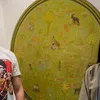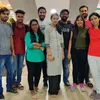Composition, communication, community – how these artists worked on their creativity during the pandemic
In this photo essay, we showcase artworks and journeys of three artists. It is key to engage with audiences and influencers to cross new creative frontiers, they explain.
Launched in 2014, PhotoSparks is a weekly feature from YourStory, with photographs that celebrate the spirit of creativity and innovation. In the earlier 540 posts, we featured an art festival, cartoon gallery. world music festival, telecom expo, millets fair, climate change expo, wildlife conference, startup festival, Diwali rangoli, and jazz festival.
In this photo essay series, we profile artworks and creative insights from the participating artists at Chitra Santhe 2021 (see our extended coverage here).
Hosted by Karnataka Chitrakala Parishath in Bengaluru, the 18th edition of the annual art festival was held virtually due to the pandemic. It featured over 1,000 artists from India and overseas.
See also YourStory’s coverage of six earlier editions of Chitra Santhe: 2020, 2019, 2018, 2017, 2016 and 2015, as well as compilations of Top Quotes of 2020 on Art in the Era of the Pandemic, Indian Art, Art Appreciation and Practice, and Beauty and Business of Art.

Artist: Suruchi Jamkar
Kavya Vyas
“Art is a self-reflection and expression of feelings through subjects, compositions, colours, and textures. My painting tells a story, it takes you to a different world and gives you a different perspective of life,” explains Kavya Vyas, in a chat with YourStory.
She defines success more through personal growth, via progress across a series of artworks. “Success is also in creating a lot of work, exploring new areas, experimenting, and pushing myself to create meaningful paintings,” she adds. She conveys her feelings, experiences, observations, and likings through all her paintings.
“But at the same time I feel happy when a gallery invites me to have a show with them and my painting finds a home in the buyer's house,” Kavya proudly adds.

Artist: Kavya Vyas
She has done several solo painting shows at India Art Festival Mumbai, Art Enclave Index Fairs Mumbai, Art in the Park, Indian Heritage Society Mumbai, and Art Society Mumbai. Her works have found their way to homes in India and overseas.
“Different activities and events can create an environment for more art appreciation in society,” Kavya recommends. Galleries, online platforms, social media, charity shows, and art competitions help in this regard.
She observes that though folk and rural artists have challenges in terms of getting visibility, digital platforms have opened up avenues for them, “Art buying should become more normal and popular. More art can become part of the decoration in homes since there is a lot of affordable art nowadays,” Kavya adds.
For Chitra Santhe, she created varied artworks themed on nature and dances like garba. “I am fascinated with fishes, I love the colours, patterns, texture, shapes, forms, and rhythmic movements,” Kavya describes.

Artist: Kavya Vyas
Her love for fish started in childhood when she had a fish tank in her Kerala home, something that continued wherever she went. “My longtime love flowed on canvas as I started my fish series. I am trying to add some more meanings to it with seamless flow, colours and compositions,” Kavya adds.
Her artworks are priced from Rs 5,000 to Rs 40,000. “But some big commissioned works can go higher sometimes,” she says.
Though the COVID-19 pandemic was tough on artists like Kavya, it also drove her to search within, connect with inner feelings, and concentrate on work and family. “Online is the new normal. Showcasing artworks in online galleries and social media platforms is more promising, and also has savings in cost and time,” she adds.
Online media make it easier to explore international markets as well. “My paintings got sold internationally too in these times of coronavirus,” Kavya says.
Audiences can observe artworks at any time from wherever they are. “But we all miss the physical experience of looking at artworks in galleries, interacting with artists, getting an idea of the real size of the paintings, and a feel of the colours and textures,” she laments.
Kavya also offers words of advice for aspiring artists. “Have a lot of patience, work very hard, and build self-expression beyond the influence of others,” she says.
It is important to study the works and lives of Indian and international artists. “Interact with other artists, participate in exhibitions, take feedback, and work towards improving yourselves,” Kavya adds.
“I observed that many upcoming artists’ complete focus is to sell paintings without working hard. But people will recognise you and follow you more only when they see the level of your hard work and excellence,” she cautions.

Artist: Nilesh Kumar
Nilesh Kumar
“Art is a means of expression, and is inclined to the artist's mood at the time of creation,” observes Nilesh Kumar. He sees success in commercial terms as well as recognition and awards.
Nilesh calls for greater appreciation of art in society by bring artworks, events, and artists closer to the people. “Open forums, studio visits and art discussions are key here,” he adds.
For Chitra Santhe, he prepared acrylic and oil works on canvas. “Some took 45 minutes to complete, others a few days. “I choose to keep my own style of thinking rather than being bound by commissioned works,” Nilesh says.

Artist: Nilesh Kumar
His works are priced from Rs 450 to Rs 6,500. Working full-time in software at a multinational, Nilesh is a self-taught artist.
He appreciates online exhibitions for their wider reach, particularly outside major cities where most shows are held. “But I miss actual interaction with people and students who have a keen interest in art,” he adds.
“Aspiring artists should explore all forms of artworks, and choose that which best suits their personality,” Nilesh advises.

Artist: Hemalatha NS
Hemalatha NS
“Art is an ever-inspiring activity, it always motivates and creates positive thinking,” enthuses Hemalatha NS, an artist based in Davangere. “Involvement in art practice has built up peace and satisfaction in my life,” she adds.
In addition to Chitra Santhe, she has exhibited at Karnataka Lalithakala Academy’s Tingala Chitra, and the All India Women Artists’ Contemporary Art Exhibition in Chandigarh. “These events have given me inspiration,” Hemalatha says.
She advises artists to exhibit their works in rural areas, and engage with locals to discuss new art styles and trends. “Apart from that, governments should construct art galleries in each and every corner of our country,” she recommends, as ways to increase art appreciation in society.
Hemalatha experiments with a range of works, from black and white to colours. Depending on size, medium and workmanship, her artworks are priced from Rs 5,000 to Rs 50,000.

Artist: Hemalatha NS
During the pandemic lockdowns and periods of isolation, she participated in national and international webinars and also engaged in academic research activities. “Online exhibitions help reach out to audiences across the globe,” she observes.
“But the real life of an exhibition comes only in the physical form. It offers unique opportunities to interact with audiences, curators and other artists,” Hemalatha adds.
She also offers tips for aspiring artists. “Work is worship. Do at least 50 spot sketches daily and take inputs from good art masters,” she explains.
Hemalatha signs off: “Update your art knowledge and art practice. Remember, Experience makes humans perfect.”
Now, what have you done today to pause in your busy schedule and find new avenues to harness your inner creativity?

Artist: Amit S Dewhare

Artist: Ashwini Krishnan

Artist: Ganpathi S Hegde

Artist: Priyanka Murthy

Artist: Shilpa Bhat

Artist: Kavya Vyas

Artist: Sharmila Aravind

Artist: Subhajit Paul

Artist: Swathi P N

Artist: Tiarma Sirait

Artist: V. G Andani

Artist: Uma Makala
See also the YourStory pocketbook ‘Proverbs and Quotes for Entrepreneurs: A World of Inspiration for Startups,’ accessible as apps for Apple and Android devices.
Edited by Kanishk Singh










